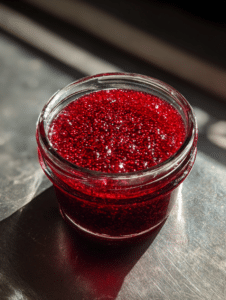Disclaimer: This content is for educational purposes only, not medical advice. Always consult with a doctor before making significant changes to your diet, especially if you have pre-existing health conditions.

The nutritional benefits of quinoa go way beyond a trendy bowl at your favorite café. This tiny seed has been fueling bodies for thousands of years, from the Andes Mountains to your kitchen counter. As a chef and mom just outside Austin, I first stumbled across quinoa during a busy weeknight dinner scramble. What started as a last-resort pantry pick quickly became a staple in our home, and my go-to for plant-based protein, blood sugar balance, and gut health.
In this article, I’ll share how quinoa supports everything from pregnancy to digestion, plus why NASA once considered it for astronaut meals. Let’s dive into the science and the story behind this humble super-seed, and why it might just change the way you think about dinner.
In this Article
Key Takeaways: What You Need to Know About Quinoa
- Quinoa is a complete protein, offering all 9 essential amino acids, rare for a plant-based food.
- It’s packed with fiber, magnesium, iron, B vitamins, and antioxidants that support energy and cellular repair.
- Quinoa is naturally gluten-free, easy to digest, and supports gut health, making it a great option for sensitive stomachs.
- With a low glycemic index and high fiber, it’s an ideal choice for people managing blood sugar or diabetes.
- Studies suggest quinoa may aid in weight loss by improving satiety and regulating metabolism.
- Quinoa has been researched by NASA as a sustainable food for long-duration space missions.
My Quinoa Story & Pantry Epiphanies
Why quinoa changed how I cook on busy nights
It was one of those chaotic evenings. My toddler was melting down, groceries were overdue, and I stood in my kitchen with nothing but some spinach, canned beans, and a neglected bag of quinoa I bought months ago during a “clean eating” phase.
I boiled it with garlic and olive oil, tossed in lemon zest and beans, and hoped for the best. That simple, earthy bowl changed everything.
Within days of swapping it into our meals, I felt lighter, more energized, and less bloated. My skin looked better. My digestion improved. I started digging into the benefits of quinoa, and what I found floored me.
What is quinoa really?
Quinoa (pronounced KEEN-wah) is a seed from the Chenopodium quinoa plant, native to the Andes and cherished by the Incas as the “mother of all grains.” Though it’s cooked and eaten like a grain, quinoa is technically a pseudocereal.
But here’s the magic: it acts like a carb, fuels like a protein, and digests like a fiber-packed veggie. It offers a unique combo of quinoa protein, fiber, and minerals, all in a gluten-free, low-glycemic package.
Why it deserves a front-row spot in your pantry
Unlike rice or pasta, quinoa brings more to the table than just bulk. It’s:
- High in protein, especially important for plant-based diets.
- Rich in fiber, which promotes fullness and supports digestion.
- Naturally low in calories compared to other grains.
- Versatile, fast-cooking, and ideal for breakfast bowls, hearty salads, and even baking.
I now use quinoa in everything from weight loss-friendly meals to my natural Mounjaro drink recipe base, pairing it with ingredients like lemon balm or apple cider vinegar and cranberry juice to support my metabolism.
What’s Inside a Spoonful? Quinoa Nutrition Facts That Matter
What are the real nutritional benefits of quinoa?
Here’s the quick truth: the nutritional benefits of quinoa make it one of the most balanced and nourishing foods on the planet. Unlike many grains, quinoa is nutrient-dense, low in calories, and provides a rare combo of fiber, protein, and essential minerals, all in one tiny seed.
Just one cup of cooked quinoa gives you:
| Nutrient | Amount (1 cup, cooked) |
|---|---|
| Calories | 222 |
| Protein | 8 grams |
| Fiber | 5 grams |
| Magnesium | 118 mg (30% DV) |
| Iron | 2.8 mg (15% DV) |
| Folate | 77.7 mcg (19% DV) |
| Manganese | 1.2 mg (58% DV) |
| Phosphorus | 281 mg (28% DV) |
| Zinc | 2 mg (13% DV) |
And here’s the kicker: quinoa contains all nine essential amino acids, making it a complete protein, just like meat or dairy. That’s rare in the plant world.
How do the benefits of quinoa compare to rice or oats?
Let’s break it down:
| Grain | Protein | Fiber | Calories |
|---|---|---|---|
| Quinoa | 8g | 5g | 222 |
| Brown Rice | 5g | 3.5g | 215 |
| Oats | 6g | 4g | 154 |
The quinoa nutrition facts show it packs more protein and fiber than most common grains, with slightly higher calories, but much more staying power. It’s not just filling, it’s fueling.
This is why I reach for quinoa in dishes like my bariatric seed recipe and protein bowls. When I mix it with chia, lemon balm, or hibiscus tea, it becomes a metabolism-supporting powerhouse that tastes as good as it makes you feel.
Why quinoa protein hits different
A lot of people ask, “Is quinoa a good source of protein?” Oh yes. And not just a source, a complete one. That means your body doesn’t have to hunt for other foods to fill in amino acid gaps. Whether you’re a weight-lifter, a new mom, or just watching your macros, quinoa protein keeps your muscle recovery strong and your blood sugar stable.
It’s no wonder quinoa was studied by NASA as a potential food for astronauts. Imagine floating in zero gravity, eating something that supports muscles, gut health, and energy, all without needing refrigeration. That’s the power of quinoa.

Nutritional Benefits of Quinoa for Weight Loss and Digestion
Can the nutritional benefits of quinoa support weight loss?
Yes, and I’ve felt it in my own body. One of the biggest nutritional benefits of quinoa is how well it supports natural weight loss, without restrictive dieting, calorie counting, or skipping meals. Quinoa doesn’t just fill your stomach; it satisfies your body’s deeper nutrient needs.
Thanks to its high protein and fiber content, quinoa:
- Curbs cravings naturally
- Increases satiety (you feel full, longer)
- Stabilizes blood sugar, avoiding the insulin spikes that cause fat storage
For my readers exploring natural weight loss solutions like the natural Ozempic drink recipe or apple cider vinegar and cranberry juice, adding quinoa to lunch or dinner makes those efforts more sustainable, and delicious.
I often pair it with herbs like lemon balm or hibiscus tea for a de-bloating, belly-friendly bowl that feels as good as it tastes.
How do the nutritional benefits of quinoa help digestion?
Gut health is one of the most overlooked nutritional benefits of quinoa. While people focus on calories or protein, the fiber profile of quinoa is just as important, especially if you’re dealing with bloating, constipation, or sluggish digestion.
Here’s how quinoa supports the gut:
- Insoluble fiber sweeps through the colon, easing constipation
- Soluble fiber feeds good bacteria in your microbiome
- Anti-inflammatory plant compounds calm irritated digestion
When I’m helping friends or readers with gut health goals, I suggest swapping refined grains for cooked quinoa, adding gut-friendly toppings like roasted fennel, fermented veggies, or a scoop of chia seeds.
Even better? Quinoa is naturally gluten-free and easy to digest, making it ideal for those with IBS, celiac, or food sensitivities. It’s no wonder so many of you love it in my bariatric-friendly seed bowls.
Can quinoa reduce bloating and support regularity?
Absolutely. This is one of the most immediate nutritional benefits of quinoa that people notice, myself included. After just a few meals, many readers report:
- Less gas and bloating
- Easier bowel movements
- Fewer sugar cravings
- More energy after eating
I’ve even had readers use it during elimination diets or alongside natural Zepbound drink recipes to maintain fiber intake without upsetting the gut.
It’s your quiet, steady helper. No drama, no crash. Just dependable nourishment.
Nutritional Benefits of Quinoa During Pregnancy
Why the nutritional benefits of quinoa are perfect for pregnancy
When I was pregnant with my second baby, I craved comfort food, but my body needed real nourishment. That’s when the nutritional benefits of quinoa really began to shine in my life.
This tiny seed is loaded with nutrients essential for a healthy pregnancy, including:
- Folate, which helps prevent neural tube defects
- Iron, which supports red blood cell production
- Magnesium, which aids in muscle and nerve function
- Protein, for fetal growth and maternal energy
According to the USDA FoodData Central, one cup of cooked quinoa contains about 77 micrograms of folate, covering nearly 20% of the recommended daily value for pregnant women.
And unlike white rice or pasta, quinoa delivers those nutrients with lower carbs, more fiber, and absolutely no gluten, ideal for anyone managing gestational diabetes, inflammation, or bloating.
Testimonial: What one expecting mom experienced with quinoa
“During my second trimester, I struggled with low iron and morning nausea. I started making Abby’s quinoa and roasted veggie bowls twice a week. Within a month, my energy levels improved, and I finally felt satisfied after meals without feeling heavy or bloated. Total game-changer.”
— Kayla S., Austin, TX
This is exactly why I recommend adding quinoa to prenatal meal plans. Whether you stir it into soups, build a warm salad, or pair it with the natural Mounjaro recipe, the benefits of quinoa gently support both mama and baby.
How quinoa helps postpartum recovery, too
The nutritional benefits of quinoa don’t stop after delivery. For postpartum moms, quinoa:
- Rebuilds muscle tissue thanks to its complete protein
- Fights fatigue with complex carbs and iron
- Supports hormone regulation through magnesium and fiber
I’ve had clients mix quinoa with turmeric, lemon, and leafy greens for a nourishing postpartum lunch that’s easy on the stomach and energizing for those long, sleepless days.
Nutritional Benefits of Quinoa for Astronauts and Extreme Conditions
Why are the nutritional benefits of quinoa good enough for space?
When NASA considers adding a food to space missions, it needs to check several boxes:
- Long shelf life
- High nutritional density
- Easy to prepare
- Supports metabolism, immunity, and energy in zero gravity
Guess what made the list?
The nutritional benefits of quinoa landed it a spot in NASA’s Controlled Ecological Life Support System (CELSS) research. In studies by the National Aeronautics and Space Administration, quinoa was evaluated as a crop that could potentially sustain astronauts on long-duration missions, like those heading to Mars.
Why quinoa? It’s:
- Rich in protein to prevent muscle wasting in microgravity
- Full of magnesium and iron, essential for oxygen transport
- Naturally pest-resistant, making it easier to grow in controlled environments
That’s a lot of power packed into one little seed.
From deep space to daily life: Why quinoa matters here on Earth
You don’t have to be floating in a space station to benefit from quinoa. The nutritional benefits of quinoa support anyone who:
- Lives an active, high-stress lifestyle
- Needs sustained energy without blood sugar crashes
- Wants a plant-based protein source that’s complete and clean
In fact, I often suggest quinoa to readers trying natural bariatric-friendly recipes or those supporting hormone health with lemon balm for weight loss. It adapts to both savory and sweet meals, and never leaves you feeling weighed down.
Quinoa: The survival seed
Here’s something I always tell clients: if you had to survive off one single food for a week, quinoa would be near the top of that list. Why?
Because the benefits of quinoa go beyond macros. It contains:
- Flavonoids like quercetin and kaempferol that reduce inflammation
- Slow-digesting carbs for balanced energy
- Minerals that support brain, heart, and immune function
It’s not just trendy. It’s resilient, just like you.
Nutritional Benefits of Quinoa for Diabetes and Blood Sugar Control
Can the nutritional benefits of quinoa help with diabetes?
Absolutely. The nutritional benefits of quinoa make it a smart, safe carb for anyone managing type 2 diabetes, insulin resistance, or metabolic health. Unlike white rice or white bread, quinoa won’t send your blood sugar on a rollercoaster ride.
Here’s why:
- Low glycemic index (~53): quinoa digests slowly, avoiding blood sugar spikes
- Rich in fiber (5g per cup): slows glucose absorption
- High in magnesium: supports insulin sensitivity
- Complete protein: balances meals and prevents cravings
These benefits make quinoa a cornerstone ingredient for recipes like my natural Ozempic drink alternative and my chia + seed bowls, where every bite counts for blood sugar balance.
How quinoa compares to other carbs for blood sugar control
Let’s look at how it stacks up:
| Food | Glycemic Index (GI) | Fiber (per cup) |
|---|---|---|
| Quinoa | 53 | 5g |
| White Rice | 73 | 0.6g |
| Couscous | 65 | 2.2g |
| Sweet Potato | 63 | 4g |
The quinoa nutrition facts speak for themselves. Swapping rice or pasta for quinoa can help flatten glucose curves and reduce insulin spikes after meals, especially when paired with proteins and healthy fats.
How I’ve used quinoa with diabetic clients and readers
Many readers who follow my natural Zepbound recipe plan have written in to say quinoa made the biggest difference in their blood sugar control. Here’s what one reader shared:
“I started adding ½ cup of cooked quinoa to lunch salads instead of crackers or bread. My CGM (continuous glucose monitor) readings dropped by 15–20 points, and I wasn’t as hungry at night. It’s become my staple.”
— Michelle W., Houston, TX
That’s the real-life power of the nutritional benefits of quinoa: it satisfies without spiking, fuels without crashing, and tastes amazing in everything from bowls to breakfast.

FAQ – Your Quinoa Questions, Answered
Is quinoa healthy?
Yes, quinoa is very healthy. The nutritional benefits of quinoa include high-quality protein, dietary fiber, antioxidants, and essential minerals like magnesium and iron. It’s gluten-free and supports digestion, energy, and heart health, making it a smart choice for nearly any diet.
Is quinoa a good source of protein?
Absolutely. One of the top nutritional benefits of quinoa is that it’s a complete protein. It contains all nine essential amino acids, offering 8 grams of protein per cooked cup, perfect for plant-based eaters or anyone needing extra muscle support and recovery nutrition.
Is quinoa good for pregnancy?
Yes, quinoa is excellent during pregnancy. The nutritional benefits of quinoa include folate for fetal development, iron for blood volume support, and protein for growing tissue. It’s also easy to digest, which is helpful during hormonal shifts and sensitive digestion in pregnancy.
What nutrients are in quinoa?
The nutritional benefits of quinoa come from its rich profile of nutrients, including protein, fiber, magnesium, folate, manganese, iron, and phosphorus. It also contains beneficial plant compounds like flavonoids that fight inflammation and support cellular health.
Is quinoa good for gut health?
Yes, quinoa supports gut health. It’s packed with both soluble and insoluble fiber, which promote bowel regularity, feed healthy gut bacteria, and reduce inflammation. One of the best nutritional benefits of quinoa is its ability to ease bloating and support digestion naturally.
Is quinoa good for astronauts?
Yes, quinoa has been studied by NASA as a space-friendly food due to its impressive nutrition. The nutritional benefits of quinoa, including its complete protein, high fiber, and rich mineral content, make it ideal for sustaining energy and muscle mass during long-duration space missions.
Is quinoa good for diabetes?
Definitely. The nutritional benefits of quinoa include a low glycemic index, high fiber, and complex carbs that help regulate blood sugar. Quinoa is one of the best carbohydrate choices for people with diabetes or those managing insulin resistance.
Can quinoa help bloating and constipation?
Yes, quinoa can relieve both. Thanks to its fiber and anti-inflammatory compounds, one of the key nutritional benefits of quinoa is smoother digestion. It helps reduce bloating, supports regular bowel movements, and feeds beneficial gut bacteria naturally.
Conclusion: Let Quinoa Work Its Quiet Magic in Your Life
It’s funny how the simplest things, like a forgotten bag of quinoa in the back of your pantry, can change everything.
For me, it wasn’t about going on a “superfood” craze or reinventing dinner. It was about finding one ingredient that made me feel full, nourished, and better in my body. The nutritional benefits of quinoa snuck in gently and stayed for good.
Whether you’re:
- Rebuilding strength postpartum
- Managing diabetes
- Soothing your gut
- Or just tired of food that doesn’t do anything for you…
Quinoa shows up.
It fuels without fuss. Supports without sugar. And it plays well with everything from hibiscus tea to natural Zepbound-friendly recipes.
So here’s your gentle nudge: cook one cup. Pair it with what you have. Taste how it fills you up without weighing you down. That’s the kind of everyday magic your body deserves.



